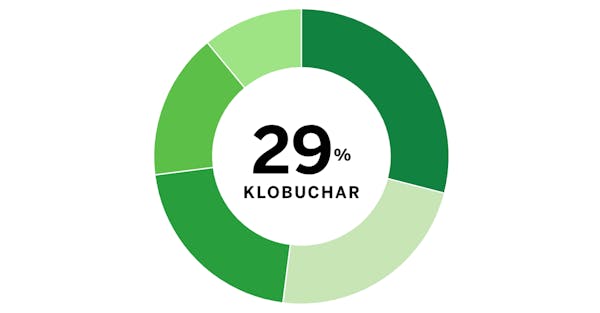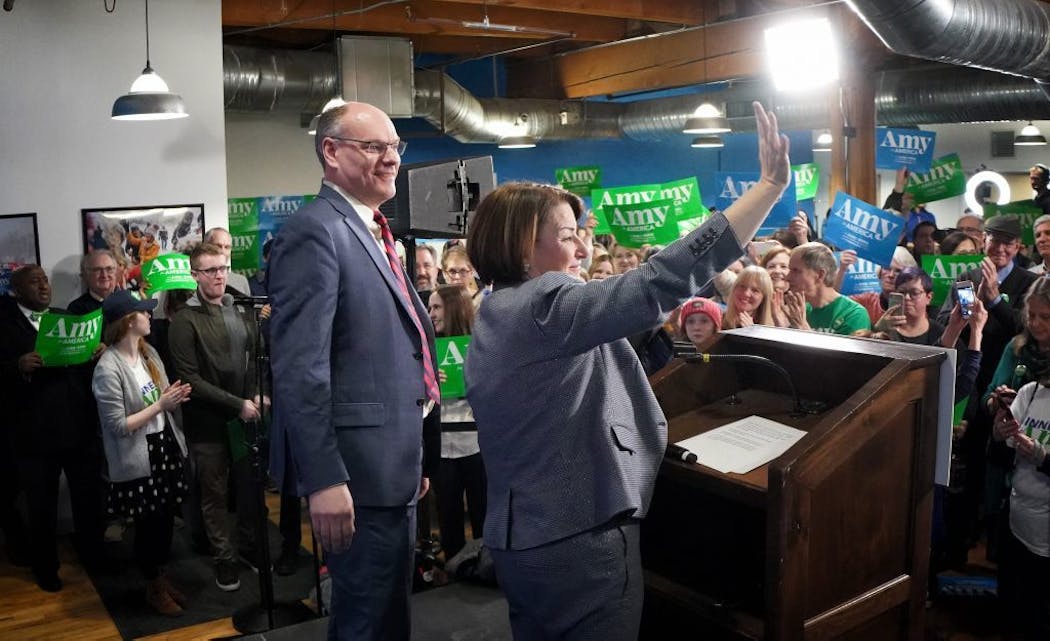Minnesota Sen. Amy Klobuchar leads Vermont Sen. Bernie Sanders in a new Star Tribune/MPR News Minnesota Poll as the state's March 3 presidential primary nears, with both well ahead of their nearest Democratic rivals.
But many Minnesota Democrats say they are still undecided in a contest that has become increasingly muddled as it spreads to more U.S. states. Minnesota's primary is on Super Tuesday, when 14 states will award a third of all the delegates in the race.
Between them, Klobuchar and Sanders have the support of more than half the 500 likely Democratic primary voters who were polled. Undecided voters made up the next biggest block, reflecting uncertainty in a race that has seen Sanders emerge as a national front-runner even as he's dogged by questions about his age and electability against President Donald Trump.
Trailing Klobuchar and Sanders were Massachusetts Sen. Elizabeth Warren and former Vice President Joe Biden, statistically tied for third. The rest of the field, including former South Bend, Ind., Mayor Pete Buttigieg and former New York Mayor Michael Bloomberg, polled in the low single digits.
The poll found Klobuchar leading Sanders significantly among women, while Sanders held a smaller edge over Klobuchar among men. He did better with voters under 50 and who earn less than $50,000 a year. Klobuchar led in greater Minnesota and in Hennepin and Ramsey counties, while Sanders held a small lead in the rest of the Twin Cities region.
For many poll respondents, Klobuchar seemed to win the electability argument, a centerpiece of her campaign.
"I tend to lean more left" than Klobuchar, said Katherine Pomerleau, a 44-year-old media producer in Minneapolis who participated in the poll.
But she's planning to vote for her home-state senator because, she said, she's convinced she has a better chance of beating Trump in November.
"I think someone in the middle makes more sense," Pomerleau said.
Joseph Raycraft, a 62-year-old grocery store stocker in Two Harbors, said he supports Sanders but is wary of his chances.
"I believe in his platform. I think this country needs a drastic overhaul. Income inequality is the number one problem," Raycraft said. But he volunteered that he, too, is "a bit torn because I fear that he may not be able to win the general election."
Klobuchar's lead over Sanders is within the poll's margin of error of plus or minus 4.5%. The poll was conducted Feb. 17-20.
The most recent Democratic debate, which saw contentious sparring among most of the leading candidates, was on Feb. 19.
The Minnesota Poll results follow similar totals in a poll released last week by the University of Massachusetts Lowell's Center for Public Opinion.
In that poll, Klobuchar had the support of 27% of likely Democratic primary voters in Minnesota and Sanders had 21%. Warren was at 16%. They were the only three candidates above 15% in the UMass poll.
The large number of undecided voters in the Minnesota Poll suggests that despite Klobuchar's home-state lead, the Democratic primary in the state is far from settled.
With Klobuchar trailing in national polls, some voters are waiting to see how the field shakes out before they commit.
"I honestly don't know which way to go right now," said Leland Jenson, a Vietnam veteran on disability who lives in Detroit Lakes. Jenson, 73, said he's likeliest to vote for Klobuchar or Buttigieg — "but I don't want to lock myself in until we see where this thing is at by Super Tuesday."
Warren got slightly more support in the poll than Biden, though they were essentially tied.
That result, if it holds, would represent a significant setback for the former vice president, who started the race as the presumptive national front-runner. U.S. Rep. Tulsi Gabbard of Hawaii and businessman Tom Steyer barely registered in the poll.
Michael Brydone-Jack, a 29-year-old doctor who lives in Long Lake, voted early for Warren — and hopes her aggressive performance in the last debate revives her chances.
Brydone-Jack was also among the plurality of those polled who called health care the most important issue in the Democratic race.
"I work at Hennepin County Medical Center," Brydone-Jack said. "I see some of the poorest people in this community, and people are really struggling despite this supposedly booming economy. My parents lost their home to health care costs. I'm not out of my residency yet and we still struggle to pay bills."
Other top issues driving Democrats include climate change and the environment and income inequality.
But several poll participants said in interviews that their choice of candidates is driven, more than anything else, by a desire to unseat Trump.
"We have to beat Trump," said Charlotte Miller, an 87-year-old retired dietitian from Minnetonka.
She's undecided but said her current most likely choices are Biden and Bloomberg, who also have made electability their central campaign pitches.
"I think Biden probably has the best chance [against Trump]," she said.
Lauren Hare, a 22-year-old health care worker and property manager in Chatfield, said she's for Biden because of his service under former President Barack Obama. "Biden just has more experience at the presidential level than Klobuchar, and we need that to beat Trump," Hare said.
As a home-state senator, Klobuchar would be expected to have an advantage in Minnesota. She has long been the most popular statewide politician in a range of polls.
"I feel of the centrists she is most qualified," said Michael Bailey, a 47-year-old marketing consultant from White Bear Township. Ouida Crozier, a retired state worker from Minneapolis, said she voted early for Klobuchar after deciding in several recent debates that "she has started to show the ability to appeal outside Minnesota."
But Minnesota is the first state to show Klobuchar leading in a presidential poll.
Despite a surprise third-place finish in the New Hampshire primary, Klobuchar needs to rack up some delegates on Super Tuesday if she's to remain a factor in a Democratic race.
There are 92 delegates at stake in Minnesota's primary.
Sanders won Minnesota's 2016 Democratic presidential caucuses, besting Hillary Clinton.
He has campaigned in the state and has support from two prominent activist Democrats, Attorney General Keith Ellison and U.S. Rep. Ilhan Omar.
"I like what he says about reforming so much of what's corrupt, and how the country's not really working for the majority of Americans," said Michael Lund, 39, who works for the post office in Ely.
Lund said Sanders is his likeliest choice but that he could still change his mind; he said he's not totally on board with Sanders' embrace of a Medicare for All health care model.
The state's shift from caucuses in 2016 to a primary this year could benefit Klobuchar, given primary elections typically attract greater turnout than caucuses, which tend to attract more activist-minded voters.
Raycraft, the Sanders supporter from Two Harbors, said he supported Sanders four years ago — and then couldn't bring himself to support Clinton in the general election.
"I ended up voting for the Green Party candidate, Jill Stein," he said.
This time, Raycraft said, he won't be sending any messages to the Democratic Party.
"I will vote for the Democratic nominee, whoever it is," he said.
Biden administration restricts oil and gas leasing in 13 million acres of Alaska's petroleum reserve
Biden's new Title IX rules protect LGBTQ+ students, but transgender sports rule still on hold
Finding an apartment may be easier for California pet owners under new legislation
Jury selection could be nearing a close in Donald Trump's hush money trial in New York



